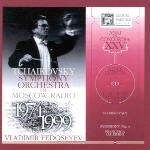Throughout his Tchaikovsky symphony cycle Vladimir Fedoseyev has striven to expose the music’s inner detail, and he has achieved this to such a degree that we clearly hear into the center of the composer’s rhythmic and harmonic construction. Fascinating as this is, it sometimes comes at the expense of the music’s dramatic thrust, most damagingly in the case of the Fourth, surely Tchaikovsky’s most histrionic symphony. The opening is certainly stark enough, and the minor-key string theme steals in with a hidden menace; but when it builds to a climax the temperature never reaches the boiling point the way it does with Mravinsky, Markevitch, Bernstein, and Beecham (to name just a few). The same goes for the climax of the second subject, where the trumpets are barely audible when they should be piercing, providing as they do the passage’s rhythmic energy. A similar pattern follows in the development and recapitulation, although Fedoseyev does muster up adequate fire for the devastating coda. In the andante second movement Fedoseyev tries to lay on feeling by slowing down the central major-key section as it reaches its summit–it worked for Bernstein, but here it just gets bogged down in sludge. The scherzo goes by harmlessly and the finale is vibrant but not particularly thrilling. The return of the fate theme brings two powerful percussion crashes, making this the most excitingly performed passage in the movement.
As Tchaikovsky’s most violently emotional tone poem, Francesca da Rimini makes a particularly apt coupling. But Fedoseyev’s distinctly non-violent performance is more like a page from Gandhi or Martin Luther King Jr. than a reference to the tragic story of Francesca and her lover Paolo. What should terrify merely titilates. Again, Fedoseyev’s exposure of previously unheard detail provides much interest for students of the score, but aside from the brass blaring out the central love theme (in their most proud Russian style) there’s little else to get the blood running. Try Bernstein/Israel Philharmonic, Markevitch/Philharmonia, or Svetlanov/Russian Federation State Symphony to hear the kind of hell Tchaikovsky imagined. Warm and full recorded sound notwithstanding, these are not your performances of choice.
































